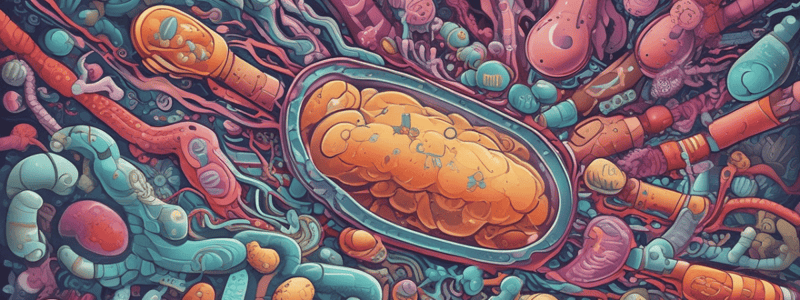Podcast
Questions and Answers
Which mechanism does chloramphenicol act on?
Which mechanism does chloramphenicol act on?
- Cell wall
- Protein synthesis sites (correct)
- Metabolic pathways inhibition
- DNA synthesis inhibition
Campylobacter jejuni is considered?
Campylobacter jejuni is considered?
- Anaerobic bacteria
- Microaerophilic (correct)
- Aerobic
- Facultative
Which antibiotic does not work by binding the 50S ribosomal subunit?
Which antibiotic does not work by binding the 50S ribosomal subunit?
- Tedizolid
- Erythromycin
- Clarithromycin
- Streptomycin (correct)
Which penicillin antibiotic must be taken by injection?
Which penicillin antibiotic must be taken by injection?
Which of the following is not an antistaphylococcal penicillin?
Which of the following is not an antistaphylococcal penicillin?
Kanamycin is produced by which bacteria?
Kanamycin is produced by which bacteria?
The original compound isolated from Streptomyces lactamdurans is a derivative of?
The original compound isolated from Streptomyces lactamdurans is a derivative of?
Which of the following antibiotics is a fifth-generation cephalosporin?
Which of the following antibiotics is a fifth-generation cephalosporin?
Flashcards
Chloramphenicol's Mechanism
Chloramphenicol's Mechanism
Chloramphenicol targets the sites where protein synthesis takes place within cells.
Campylobacter jejuni's Oxygen Needs
Campylobacter jejuni's Oxygen Needs
Campylobacter jejuni thrives in environments with low oxygen levels, but still requires some oxygen to survive.
Streptomycin's Target
Streptomycin's Target
Streptomycin works differently. It binds to the 30S ribosomal subunit, not the 50S subunit.
Oxacillin Administration
Oxacillin Administration
Signup and view all the flashcards
Piperacillin's Specificity
Piperacillin's Specificity
Signup and view all the flashcards
Kanamycin's Source
Kanamycin's Source
Signup and view all the flashcards
Streptomyces lactamdurans' Origin
Streptomyces lactamdurans' Origin
Signup and view all the flashcards
Ceftaroline's Generation
Ceftaroline's Generation
Signup and view all the flashcards
Study Notes
Cephalosporinase and Chloramphenicol Acetyltransferase
- Cephalosporinase is a type of β-lactamase.
- Chloramphenicol acetyltransferase is an enzyme that inactivates chloramphenicol.
Bacteria and Antimicrobials
- Campylobacter jejune is a microphilic bacteria.
- Chloramphenicol acts by inhibiting protein synthesis.
- Antibiotics can inhibit bacterial growth by targeting the cell wall, DNA synthesis, or metabolic pathways.
Antibiotic Mechanisms
- Streptomycin, Clarithromycin, and Tedizold work by binding to the 50S subunit.
- Penicillinase-resistant penicillins include Oxacillin and Dicloxacillin.
- Antistaphylococcal antibiotics include Oxacillin, Dicloxacillin, and Nafcillin.
Antibiotic Sources
- Kanamycin is produced by Streptomyces bacteria.
- Cephalosporins are derived from the fungus Cephalosporium lactamdurans.
Antibiotic Generations
- Cephamycins are a type of antibiotic.
- Cefepime and Ceftazidime are fifth-generation cephalosporins.
- Ceftaroline is a fifth-generation cephalosporin.
Studying That Suits You
Use AI to generate personalized quizzes and flashcards to suit your learning preferences.




